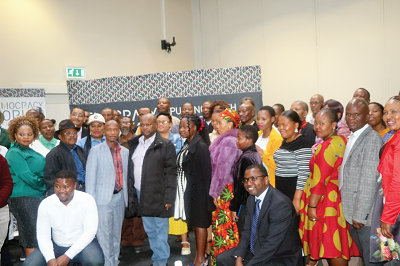By Thoboloko Nts’onyane
MASERU – Following the recent national elections held on October 7, last year the political parties held a reflective exercise where they took stock of the elections with a view to improve their performance going forward.
The DWF Regional Director who doubles as the Chief of Party for the Southern African Political Parties and Dialogue (SAPP&D) Dr Augustine Magolowondo said: “Elections must not be window dressing. Elections must indeed be the only way that the will of the people can be addressed,” he said.
He said the DWF is committed to strengthening a resilient democracy.
The Regional Director further said it is important that DWF partners with the political parties that yesterday’s meeting was meant to take stock of the recent elections performance, that parties should ask themselves what is it that we have done better; how did we prepare ourselves; how do we mobilize resources; how did we select candidates; how do we manage conflicts?”
“We cannot improve unless we change, we cannot change unless we know where to improve”, he remarked.
Candidates are the reflections of society. The decision which the party takes to field its candidates has an impact within the nation. Just by fielding candidates, one is able to tell how that particular party views the socio-economic rights.
He said in democratic dispensation, in some instances the decisions of the political party leaders should be challenged.
He said democracy must survive the cultural norms and beliefs within the society at which it practiced.
Political parties are “central” in a democracy.
“We support political parties to participate in elections. As part of our contribution to democratic elections we were able to partner with some of you to ensure that you have relevant knowledge to participate in the electoral process. We were also able to support political parties to be able to monitor the elections,” he said.
Dr Magolowondo pointed out that there are challenges pertaining to elections.
Prominent civil society activist, analyst and commentator Sofonea Shale said
He said 12 percent of the parties are led by women.
He said one of the challenges confronting parties is that of leadership, saying while in some the leader is respected and is not challenged whereas in some the leaders are not accorded much respect.
Shale is of the belief that “There is a considerable crip of young people in politics both in leadership and in the rank and file,”
Both local and international elections observers said that the 2022 national elections, were held in a peaceful environment. This is despite the challenges that confronted the Independent Electoral Elections (IEC).
He underscored that the National Assembly Electoral Act, 2011 requires that the parties facilitate the full participation of women, youth and disabled persons in political activities on the basis of equality.
Shale warned that some parties are not known to the voters hence the voter’s choice is limited on the ballot box.
One of the participants ‘Masamuel Hlobotsi from Mekhoa le meetlo ea Basotho said they have not performed as well as expected.
She said the challenge was that of reaching constituencies especially in the mountainous areas.
Hlobotsi said going forward they are going to make use of the media more in order to engage their prospective electorates and reach many audiences.
She said the meeting provided the platform to share experiences and learn from those who have won the elections and have representation in parliament.
In 2017 there were 27 parties that participated in the general elections while this figure increased to 65 in 2022. The 11th parliament which was borne out of the 2022 national elections has 11 parties out of 65 that contested.
SAPP& D- programme is an ongoing programme supported by the USAID and it is rolled out in Lesotho including Angola, Botswana, Eswatini, Malawi and Zambia.


